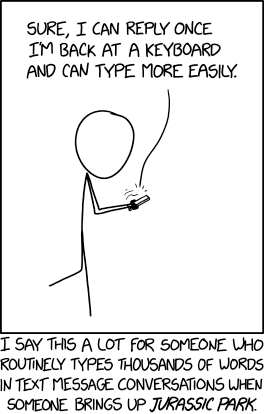Cueball is texting someone on his phone. However, since with a full sized physical keyboard you can type with all of your fingers, which is usually a much faster and more accurate way than using an on-screen keyboard on a smartphone, Cueball cuts off the conversation and says he will get back to whoever he was talking to when he can type on an actual keyboard, presumably at home and on his computer. While there are multiple techniques for making a smartphone increasingly easier to enter words into using its on-screen virtual keyboard, such as keyboard swiping, on-the-fly spelling and grammar checkers, and voice recognition to minimize using the keyboard at all, the combination of a full-sized keyboard along with a generous sized screen is hard to beat for speed and accuracy when typing larger blocks of text.
The joke is that despite claiming to be more proficient with a physical keyboard, rather than a digital one, Randall still goes into long rants through messages on his smartphone, whenever anybody brings up Jurassic Park.
There might also be a reference on Dennis Nedry, a character from the first Jurassic Park film. The programmer is responsible for a security sabotage and intends to be away from his keyboard only for a short while, but dies (not altogether) unexpectedly, worsening the situation in the park.
The title text shows a typical sentence from Randall after having been in a chat over his phone. Before the sentence he has written 1500 words on his phone, all related to Jurassic Park, more or less. When he finally have written his fingers off he then says that he will have to stop now but once back at a keyboard, and even though he just typed 1500 words on his phone, he is ready to type even more (5000 words) using his keyboard.
The widespread uptake of mobile devices has stark implications for user-generated content sites on the internet. According to a 2014 New York Times article, only one percent of the changes to Wikipedia articles were made via mobile devices, although they displayed about a third of all Wikipedia page views that year.
